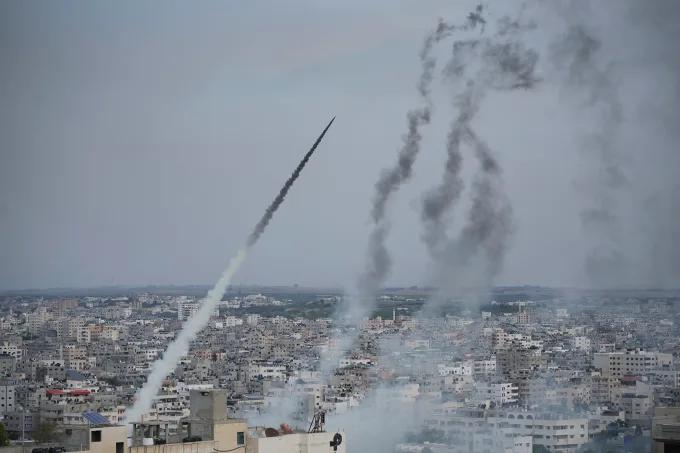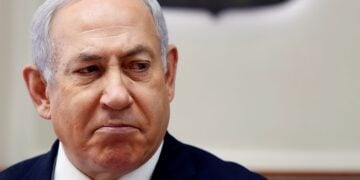Iran launched a massive retaliatory missile strike against Israel late Friday night, sending shockwaves across the Middle East and raising fears of a broader regional war.
Explosions were heard across Jerusalem and Tel Aviv, Israel’s largest cities, as air raid sirens blared and the public rushed to bomb shelters.
According to Reuters, Israel’s military confirmed that fewer than 100 Iranian missiles were fired, with most intercepted or falling short. However, several struck residential buildings, including a high-rise in Ramat Gan near Tel Aviv and another in central Tel Aviv, leaving at least two critically injured and dozens with moderate to minor wounds.
Iran’s state news agency, IRNA, claimed the attack involved “hundreds” of ballistic missiles, launched in retaliation for Israel’s earlier unprecedented strikes on Iran’s Natanz nuclear facility, one of its most fortified underground enrichment sites and the assassination of key military commanders.
The Israeli assault, described as the largest in its history against Iran, left significant damage, including the destruction of Natanz’s pilot enrichment plant. The U.N. nuclear watchdog’s chief, Rafael Grossi, told the Security Council, “We are still assessing the damage at Fordow and Isfahan, but Natanz’s above-ground plant has been destroyed.”
Iran’s Supreme Leader, Ayatollah Ali Khamenei, directly accused Israel of initiating war, declaring that “revenge will be painful… nowhere in Israel will be safe.” Iran’s U.N. envoy, Amir Saeid Iravani, reported 78 deaths, including senior military officials and over 320 injuries, most of them civilians. He blamed the United States for its involvement, warning that “it shares full responsibility for the consequences.”
Meanwhile, Israeli Prime Minister Benjamin Netanyahu justified the military campaign in a national address, stating, “Generations from now, history will record our generation stood its ground, acted in time and secured our common future.”
He urged the Iranian people to rise against their government, adding, “We do not seek war with the Iranian people, only with their oppressive regime.”
Israel’s ambassador to the U.N., Danny Danon, added gravity to the threat, revealing that intelligence showed Iran was “days away from producing enough fissile material for multiple bombs.”
Iran, however, reiterated that its nuclear programme remains strictly peaceful, a claim increasingly challenged by Western nations and the U.N. nuclear watchdog, which found Iran in violation of its obligations under the global non-proliferation treaty.
The situation unfolded just days before planned nuclear talks between Tehran and Washington, which had hoped to revive a deal to replace the 2015 agreement abandoned by former President Donald Trump in 2018. Despite the hostilities, Trump signaled the talks may still go ahead.
“They can still work out a deal — it’s not too late,” he said, revealing he had advance knowledge of Israel’s strike plans and had attempted to “save Iran from humiliation and death.”
Inside Iran, grief and fury gripped the population. In Natanz, residents scrambled for safety amid thunderous blasts.
“People on my street rushed out of their homes in panic. We were all terrified,” said 39-year-old Marziyeh.
Others pledged loyalty to the regime. “I will fight and die for our right to a nuclear programme,” vowed Ali, a Basij militia member in Qom. “Israel and America cannot take it away with these attacks.”
In a letter broadcast on state television, newly appointed Revolutionary Guards commander Maj. Gen. Mohammad Pakpour warned: “The gates of hell will open to the child-killing regime.” He was appointed after the killing of Guards chief Hossein Salami and Chief of Staff Maj. Gen. Mohammad Bagheri, part of a high-level decapitation strike that killed at least 20 senior Iranian commanders and six top nuclear scientists.
An Israeli security source revealed that Mossad commandos operated deep within Iran prior to the strikes, and that a drone base had been secretly set up near Tehran. The military claimed it destroyed “dozens of radars and surface-to-air missile launchers” during the operation.
Iran’s ability to retaliate through its regional proxies has been severely weakened in recent months, with the loss of support from Syria’s Bashar al-Assad and the heavy toll inflicted on Hezbollah in Lebanon and Hamas in Gaza. A missile fired from Yemen, reportedly by Houthi forces struck Hebron in the West Bank, injuring three Palestinian children, according to the Palestinian Red Crescent.
The global economic impact was felt instantly. Oil prices spiked amid fears of disruptions, though OPEC stated that the escalation did not yet warrant changes in supply.
Despite the growing bloodshed, Israel’s National Security Adviser Tzachi Hanegbi suggested that military action alone would not dismantle Iran’s nuclear ambitions.
“What we are doing is creating the conditions for a long-term deal, led by the United States,” he said.





